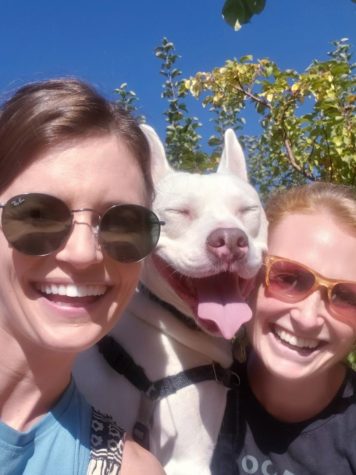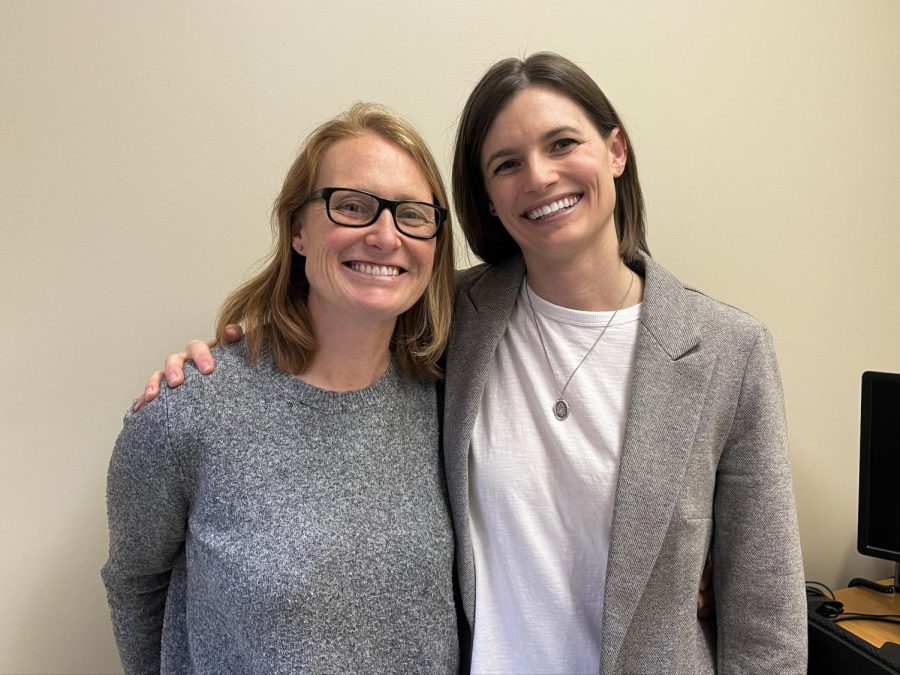Professors find love at Murrow College
WSU accepting of Tracy, Traci’s LGBTQ identities.
Thursday, Feb. 2, 2023
February 9, 2023
When Tracy Simmons moved to Pullman, she never expected to find love at Murrow College.
“I knew there was a position coming open and I was eager to get back here because it’s a really good journalism department,” Simmons said. “It all worked out that I was able just to come back.”
After a year of working as a scholarly assistant professor in the journalism department, Simmons met Traci Gillig (she/they), an assistant professor in the Department of Strategic Communication.
“We didn’t know each other until a year or so into working here,” Gillig said. “Then we met through friends and colleagues.”
Simmons said she first became interested in Gillig after seeing them over Zoom during a faculty meeting. She said professor Justin Barnes organized a Murrow faculty event where they first met in person.
“He coordinated a faculty happy hour with just a couple of faculty members and happened to invite the two of us so we could meet,” Simmons said. “Then I started asking Traci if she wanted to go for a bike ride or go hiking.”
She said she developed a crush on Gillig right away and would find little excuses to message them or invite them to hang out as friends.
“We joke now that we were pre-dating for six months before we officially went on a date,” Simmons said.
Now, Gillig and Simmons are engaged and are planning to get married over the summer.
Simmons said that she and Gillig had been discussing getting married after they bought a house together in August and Gillig asked her for her ring size.
However, it was Simmons who ended up proposing on Jan. 30.

“One evening I was doing laundry and I went into the bedroom and there was just this ring sitting on my nightstand,” Gillig said. “I thought that was her way of surprising me with a proposal, so I came up with a ring and I was like ‘What’s this?’ And she said, ‘Oh, that’s the ring for my ring size.’ Then that evening she slipped the real ring right under my pillow.”
Despite the change from an extremely visible LGBTQ+ presence, Gillig said Pullman and the WSU community have been extremely accepting.
Gillig said it was an adjustment moving from Los Angeles, where they were a doctoral student, up to Pullman.
“There’s just so many gayborhoods and that sort of thing there,” they said. “So, it was different coming here, where that wasn’t quite as visible.”
Simmons said she is accustomed to living in Eastern Washington, as she lived in Spokane before moving to Pullman.
“In Spokane, there’s a larger LGBTQ community, but it seems like everyone’s already coupled and has family,” Simmons said.
Simmons said there had been challenging experiences interviewing anti-gay sources as an LGBTQ+ journalist.
“I was covering six churches that were leaving the Episcopal Church over gay marriage,” Simmons said. “I interviewed both sides, and the denominational leaders who are leaving the Episcopal Church said things that were really hard for me to hear.”
Simmons said that there were times she was shaken by what anti-gay sources said. Despite the experiences being uncomfortable, they helped her become more objective as a journalist, she said.
“I had to go back and talk to them again, and I had to quote them,” she said. “I think it helped me become a better reporter, learn how to practice objectivity, and learn how to cope with some of the interviews.”
Simmons said she has been accepted and treated well after publicly coming out.
“I don’t feel like I’m having to hide and pretend to be something I’m not,” she said. “People had opinions of who I was either way, and so by just putting them out there, I think my transparency is respected.”
Gillig said they have felt very accepted throughout their career and research.
“In my experience as a scholar and as a researcher, my identity has been very tied into the work that I do,” Gillig said. “I was talking about my interests and felt really supported by faculty. It felt like I just had a path for everything. My identity and my work were all sort of intertwined, so I felt super supported in the scholarly world.”
“I didn’t think I would find my person in the Murrow College,” Simmons said. “It just worked out.”










Bob • Feb 11, 2023 at 9:49 pm
Did anyone need to know this fact about professors? And what happened to the professional norm of not becoming romantically involved with a co-worker?
Les Merz • Feb 9, 2023 at 12:05 pm
Congrats to Tracy & Traci,
Yes, things have changed in Pullman since I entered as a freshman in the fall of 1973. In the spring of ’74 I became a member of The Daily Evergreen staff. I’m thrilled to see the openess and acceptance. I wish Tracy and Traci much happiness and the absolute best of everything!